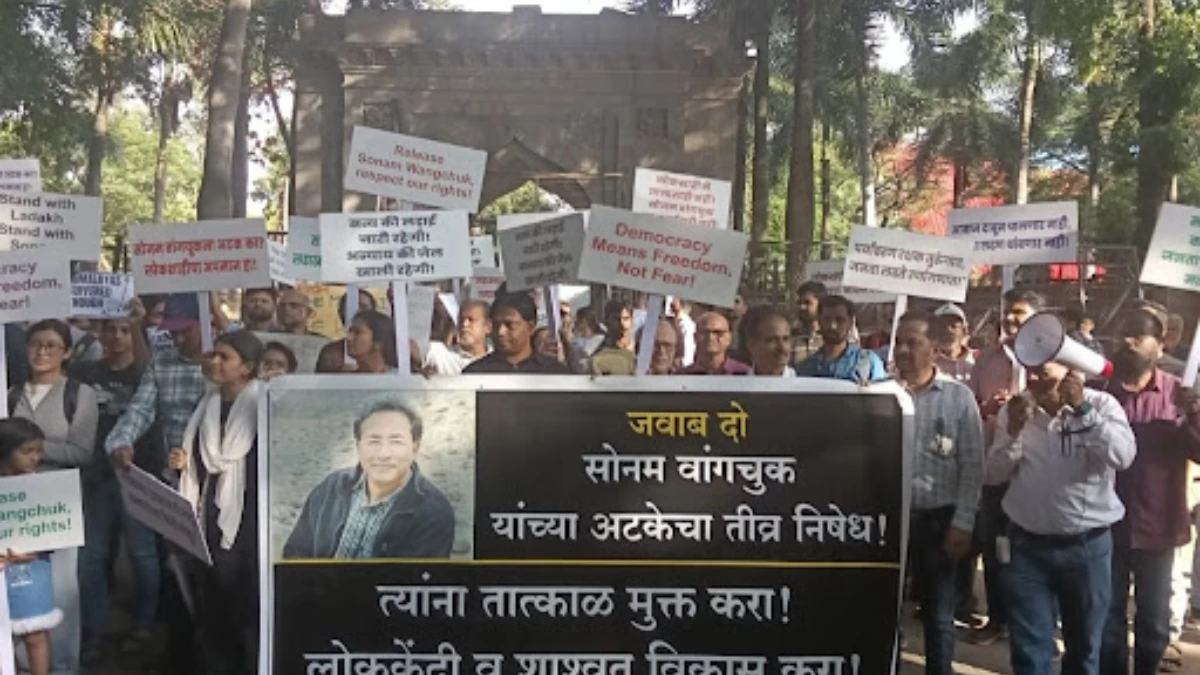
Pune stands with Sonam Wangchuk — Citizens call for justice and statehood for Ladakh | puneripages.in
By Prashant for PuneriPages.in
In a powerful show of solidarity, citizens in Pune have joined voices from across India demanding the immediate release of environmental activist and education reformer Sonam Wangchuk. The movement, which has gained momentum nationwide, also echoes a louder call for statehood and constitutional rights for Ladakh, emphasizing the need for sustainable governance and democratic representation in the Himalayan region.
Table of Contents
Who Is Sonam Wangchuk and Why Is His Arrest Stirring Nationwide Protests?
Sonam Wangchuk, known globally as an innovator, engineer, and environmentalist, became a household name after his life inspired Aamir Khan’s character in 3 Idiots. Beyond fame, Wangchuk has been a consistent voice for climate conservation, sustainable education, and ecological preservation in Ladakh.
His recent detention has sparked widespread outrage, as many believe his arrest is linked to his outspoken stance on climate change, local governance, and the demand for statehood. Wangchuk has long advocated for protecting Ladakh’s fragile ecosystem and ensuring local communities have a say in its development policies.
Protests in Pune: Citizens Stand in Solidarity with Ladakh
On Saturday, hundreds of Pune residents gathered at Sambhaji Park, holding placards that read “Free Sonam Wangchuk” and “Statehood for Ladakh Now!”. The crowd comprised students, environmentalists, retired defense personnel, and activists, all uniting under a common demand — justice and representation for the people of Ladakh.
Volunteers from multiple organizations, including the Pune Climate Collective and Youth for Himalaya, took part in the peaceful demonstration. Protesters emphasized that Ladakh’s unique culture, biodiversity, and geopolitical importance demand a governance model that prioritizes both autonomy and sustainability.
Why the Demand for Statehood in Ladakh Is Growing Louder
Since Article 370 was revoked in 2019, Ladakh became a Union Territory directly governed by the Centre. However, residents have consistently voiced concerns about lack of legislative powers, environmental threats, and limited local decision-making.
Wangchuk and other activists have repeatedly urged the government to grant Ladakh statehood and inclusion under the Sixth Schedule of the Indian Constitution, ensuring protection for its land, resources, and cultural identity.
Protesters in Pune echoed this sentiment, stating that “development without democracy is meaningless.” They stressed that Ladakh’s remote communities deserve the same participatory rights as citizens in other Indian states.
Environmental Concerns Fuel the Movement
Ladakh’s fragile ecosystem is facing unprecedented environmental challenges, including glacial melting, desertification, and erratic weather patterns. Experts warn that unchecked industrial projects and unsustainable tourism could cause irreversible damage to the region.
Sonam Wangchuk’s recent climate fast, conducted in sub-zero temperatures, aimed to draw attention to these issues. His arrest soon after the protest has been criticized as an attempt to silence environmental activism, further fueling public anger.
In Pune, speakers at the protest highlighted that Wangchuk’s fight is not just for Ladakh, but for the planet. His emphasis on sustainable living, solar energy, and local empowerment resonates deeply with environmentalists across India.
Voices from the Pune Protest
One of the protest coordinators, Anjali Kulkarni, an environmental studies professor, stated:
“Sonam Wangchuk represents what modern India should aspire to be — scientifically aware, ecologically responsible, and morally courageous. His arrest is a blow to free expression and environmental justice.”
Another protester, Lt. Col. (Retd.) Pradeep Joshi, remarked:
“Many ex-servicemen from Ladakh have served the nation with pride. The least the government can do is grant them political dignity through statehood and constitutional safeguards.”
Government’s Response and Public Reaction
So far, official statements from the Home Ministry remain limited, with authorities citing “security concerns” regarding Wangchuk’s activities. However, public pressure continues to mount, both online and offline.
Hashtags such as #FreeSonamWangchuk and #StatehoodForLadakh have been trending across social media platforms, amplifying the movement globally. Influencers, scientists, and even Bollywood personalities have shown their support, calling the situation “deeply concerning for India’s democratic image.”
A Larger Debate on Climate and Democracy
This protest is more than a local movement — it represents a larger national conversation about environmental justice, civil rights, and freedom of expression.
The people of Pune and other cities are uniting to demand that the government engage in open dialogue with Ladakh’s citizens instead of criminalizing peaceful dissent. The message is clear — India’s democratic strength lies in listening, not silencing.
As one student protester put it:
“When a voice like Sonam Wangchuk’s is suppressed, we all lose — because he speaks for our collective future.”
The Way Forward: A Call for Dialogue and Action
Protest organizers have submitted a memorandum to the District Collector’s office, urging immediate steps for Wangchuk’s release and the formation of an independent commission to review Ladakh’s governance model.
Experts suggest that granting constitutional protection under the Sixth Schedule could be a practical solution to preserve Ladakh’s environment while empowering its people. This would ensure that development projects undergo local scrutiny, maintaining the delicate balance between progress and preservation.
Conclusion: A Fight for the Future of Ladakh
The growing solidarity in cities like Pune shows that Sonam Wangchuk’s message has transcended regional boundaries. His vision of a self-sustained, eco-conscious Ladakh mirrors the aspirations of millions of Indians who believe in harmony between progress and nature.
Whether or not the government responds swiftly, one thing is certain — the demand for Wangchuk’s release and statehood for Ladakh will not fade away. It’s a movement rooted in truth, driven by conscience, and sustained by citizens who refuse to remain silent.